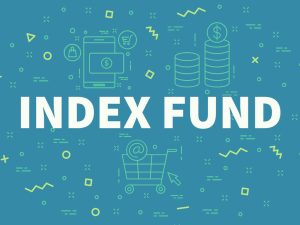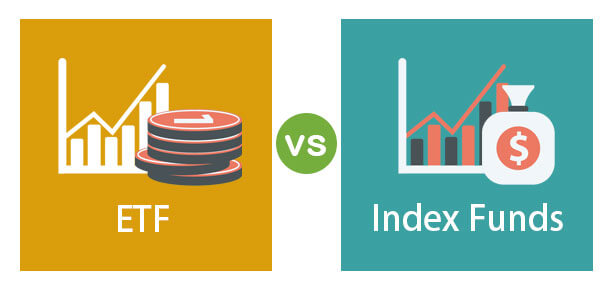When it comes to investing, you have plenty of options to choose from. One of the most important decisions you’ll make is whether to invest in ETFs or index funds.
It can be difficult to decide which is best for your investment portfolio, but understanding the differences between ETFs and index funds is key. In this blog post, we’ll take a look at ETF vs Index Fund and compare their advantages and disadvantages so you can make an informed decision.
What are ETFs?

Exchange-traded funds (ETFs) are investment vehicles that allow investors to gain exposure to a wide range of assets and markets. ETFs are similar to mutual funds, in that they both hold a variety of investments and offer diversification benefits.
However, ETFs typically have lower expenses than mutual funds, which makes them more attractive to investors.
ETFs are created by an asset management firm who builds and manages the fund for investors. Unlike mutual funds, ETFs can be traded like stocks on the stock exchange. This means that investors can buy and sell shares of an ETF throughout the day, just as they would with a stock.
ETFs generally track the performance of a particular index or sector, such as the S&P 500 or technology stocks. The holdings in an ETF are typically updated periodically, but the changes don’t happen on a daily basis. This means that an ETF’s performance will tend to track its benchmark index more closely than a mutual fund does.
As well, since ETFs are listed on exchanges, there is greater liquidity when trading compared to mutual funds. When you buy an ETF, you pay a brokerage commission, which is normally much less than you would pay for a mutual fund purchase. Additionally, most ETFs don’t have minimum investment requirements and often provide additional tax advantages compared to investing in a mutual fund.
On the other hand, some people prefer index funds over ETFs because of their higher level of transparency. With index funds, investors know exactly what securities are held within the portfolio at any given time. While some ETFs do list their holdings online, most do not provide this level of detail. Ultimately, it comes down to what type of investor you are and what kind of goals you’re trying to achieve.
Both ETFs and index funds can help you build a well-diversified portfolio, but you should evaluate your personal needs before making any decisions.
What are Index Funds?

Index funds are a type of mutual fund that invests in stocks and other securities that closely track a specific market index. Index funds are designed to mirror the performance of a certain stock or bond index, such as the S&P 500 or the Dow Jones Industrial Average. Index funds are designed to provide investors with the same return as the underlying index.
Index funds are often favored by investors who want to invest in the stock market without actively managing their portfolio. Because they track an index, they are considered low-cost investments, as they require minimal active management from fund managers. This makes index funds an attractive option for long-term investors who want to save money on fees and taxes.
In contrast to actively managed funds, index funds don’t attempt to beat the market by making stock picks or other strategic decisions. Instead, these funds simply purchase all of the securities included in the chosen index, in the same weightings as the index itself. This allows investors to benefit from broader market movements, while avoiding the risks associated with individual stock picks.
The Pros and Cons of ETFs

When it comes to investments, ETFs (exchange-traded funds) are a popular choice. They provide the potential for high returns, but with the added convenience of being traded on the stock exchange. In addition, ETFs are generally considered to be less risky than traditional stocks because they usually have a more diverse portfolio of assets.
Pros of ETFs:
• ETFs tend to have lower fees than mutual funds, making them a cost-effective option for investors.
• They provide instant diversification, which reduces risk by spreading investments across multiple asset classes.
• ETFs are highly liquid, meaning that investors can buy and sell shares in a matter of seconds.
• ETFs can be used as a tool for hedging against market volatility.
• They are relatively tax-efficient since capital gains taxes only need to be paid when shares are sold.
Cons of ETFs:
• Because ETFs trade like stocks, there is a risk that short-term trading will incur extra costs.
• ETFs may contain derivatives or leveraged securities, which can increase the risk of losses.
• Many ETFs have a higher expense ratio than index funds, reducing potential returns.
• ETFs may not track their benchmark index as closely as expected, leading to discrepancies between performance and expectations.
The Pros and Cons of Index Funds

Index funds have several advantages that make them an attractive option for investors. One of the primary benefits is their low cost compared to actively managed funds. This can be especially beneficial for investors who are trying to build a diversified portfolio with limited funds.
Index funds also tend to be more tax-efficient than actively managed funds, since there are typically fewer transactions and the capital gains tax rate is generally lower than for individual stocks. Additionally, index funds tend to be more diversified than actively managed funds, meaning they are less likely to suffer large losses in volatile markets.
Index funds can also have some drawbacks. One of the main disadvantages is that they do not provide the potential for outperformance of the overall market. Since index funds track a particular index, their performance will always match the performance of that index.
Another potential downside is that index funds may not have enough exposure to specific sectors or industries, since they are limited to the securities in the index they track. Finally, index funds may not be able to take advantage of short-term opportunities in the market, as their portfolio must remain unchanged unless the underlying index itself changes.
Which is Better for Your Investment Portfolio – ETFs or Index Funds?
When it comes to choosing the right investment vehicles for your portfolio, the decision between ETFs and index funds can be difficult. Both have their pros and cons, and it’s important to understand the differences between them before you make your final decision.
Exchange-traded funds (ETFs) offer a number of advantages that make them attractive investments.
They are highly liquid and cost-effective, meaning they can easily be traded on an exchange and require little to no commission or transaction fees. Additionally, ETFs tend to be more tax efficient, with lower capital gains taxes than other investments.
Finally, ETFs provide instant diversification, allowing you to get exposure to a variety of asset classes without having to individually select each asset.
Index funds, on the other hand, offer several distinct advantages. They often come with lower expense ratios than ETFs and require no commissions for buying or selling. They also provide simple tracking of the underlying index, so you won’t have to worry about the fund manager’s performance.
Moreover, discover the comparison between ETFs and Index Funds in your investment portfolio journey. Watch the insightful video to kickstart your understanding. Blend the video’s smarts with this simple guide to shape your investment game.
Additionally, there is no need to worry about market timing as index funds tend to perform well over time.
So which is better for your portfolio? Ultimately, the choice between ETFs and index funds depends on your personal preferences and financial goals. If you’re looking for a low-cost and tax-efficient investment vehicle that provides instant diversification, then ETFs may be the right choice for you.
However, if you’re looking for a low-cost and reliable way to track an index without having to actively manage your investments, then index funds may be the right choice. Ultimately, it’s up to you to decide which type of investment vehicle best suits your needs.
